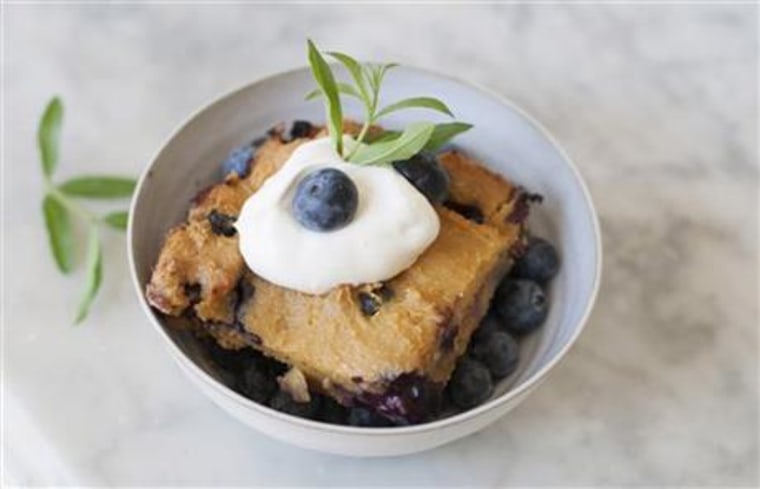Gluten-free foods are more popular than ever — but are they good for you?
In 2010, Americans spent more than $2.6 billion on gluten-free items. By the end of next year, that number will reach $5 billion, according to the National Foundation for Celiac Awareness. These sales aren’t due to an inordinate number of people with Celiac disease, which is the inability to tolerate gluten, but rather because of people hoping that by kicking the gluten habit, they’ll see smaller waistlines.
While gluten-free foods are essential to people suffering from Celiac disease, the science is still out about whether the gluten-free fad translates into real health benefits for the rest of us.
Going gluten-free? Skip the junk and try these healthy dishes
“Everybody needs the food scapegoat. [People think] if you eliminate [gluten], therefore life will be fine, all of the health issues will go away and your weight will go down and you will have the boyfriend of your dreams,” says Leslie Bonci, director of sports nutrition at UPMC Center for Sports Medicine in Pittsburgh.
Before you say goodbye to pasta, bread and beer (yes some beer has gluten in it), you might want to get the skinny on gluten-free diets.
Gluten-free doesn’t mean guilt-free
Simply cutting gluten, a protein found in grains such as wheat, rye and barley, doesn’t lead to automatic weight loss. Many of the products that are gluten-free have more calories in them. (In theory, potato chips are gluten-free but are still a terrible snack.)
“In some cases, the gluten-free has more calories because you are adding more sugar,” says Bonci.
If people substitute something like potato starch or tapioca instead flour, they might be eating more calories, not less.
“It won’t translate to weight loss,” says Bonci.
Some people believe that gluten-free equals healthy, and binge on too many quinoa chips or gluten-free ice cream.
“Looking for gluten-free substitutes [for] desserts and cakes and breads and not eating fruits and vegetables does not make you a healthier eater,” says Madelyn Fernstrom, TODAY’s health and diet editor. “Gluten-free does not mean healthier or a better choice.”
Gluten-free can lead to deficiencies
Maybe that morning bran muffin makes some feel sluggish, but it certainly helps keep things regular. Whole grains infuse much-needed fiber into people’s diets. Sometimes gluten-free diets mean that people get fewer amino acids, B vitamins and iron.
But it’s not hopeless.
“If you have a healthy diet, you don’t have to have wheat to have adequate fiber,” Fernstrom says. “It’s important for people to be attentive.”
A diet rich in fruits, vegetables, legumes and gluten-free whole grains, including buckwheat and corn, will include more than enough fiber, iron, amino acids and B vitamins.
Gluten-free can have extra sugar and salt
Products that boast they’re free of something, whether fat-free, sugar-free or gluten-free, often have extras added to make them more palatable.
“I don’t know if that is specific to gluten-free companies. There are a lot of foods on the market that are loaded with sugar and salt,” says Kristin Kirkpatrick, manager of wellness nutrition services at Cleveland Clinic’s Wellness Institute.
Rather, Fernstrom says, gluten-free simply promises no wheat protein.
“Gluten-free ice cream doesn’t have any less fat or sugars and oftentimes people are fooled,” she says. “Some of [gluten-free foods] have the same calories; some have lower calories. This has nothing to do with wheat.”
The science is still out on gluten-free
For the three million people with Celiac disease, an autoimmune disorder that damages the lining of the small intestine when people eat gluten, the science is clear — no gluten in the diet. The 18 million Americans who are gluten sensitive can eat gluten and feel gastric distress, gas, bloating and diarrhea, but not have the serious side effects that people with Celiac disease have. But, there have been no large studies showing gluten-free diets provide significant health benefits.
“We don’t really have the strong science yet,” says Kirkpatrick. “We haven’t seen in science that a gluten-free diet isn’t the magical thing we are looking for in weight loss.”
Many patients believe that gluten causes everything from autism to diabetes, Bonci says, but there isn’t evidence of any of this. There’s a lot of “pseudo science out there,” she says.
Diets low in gluten aren't always healthy
Fruits, vegetables, nuts and lean meats are naturally gluten-free.
“Lean proteins and fruits and vegetables … that can be a very healthy way to eat and that is something that has been known for decades,” Fernstrom says. “The problem is substituting gluten-free products that have a lot of calories.”
Kirkpatrick says that some gluten-free substitutions might be healthier. A buckwheat pancake might be better than a wheat pancake; just don’t eat five.
“We have a huge problem with portion control,” she says.
It doesn’t matter if a product has gluten or not. If someone overeats, the health benefit is lost.
